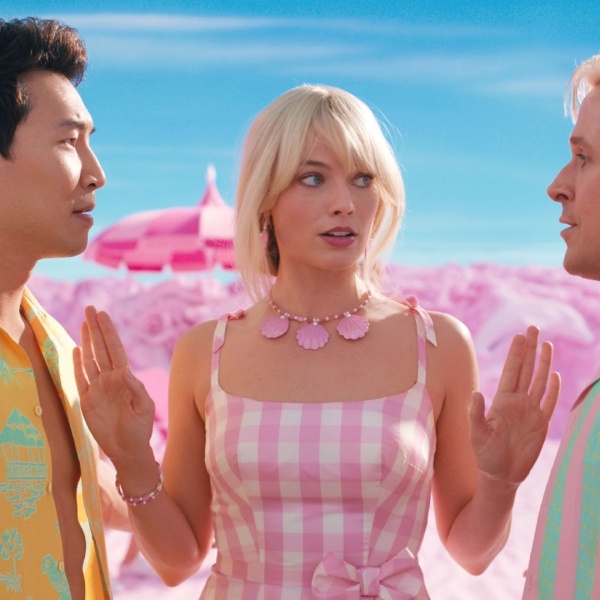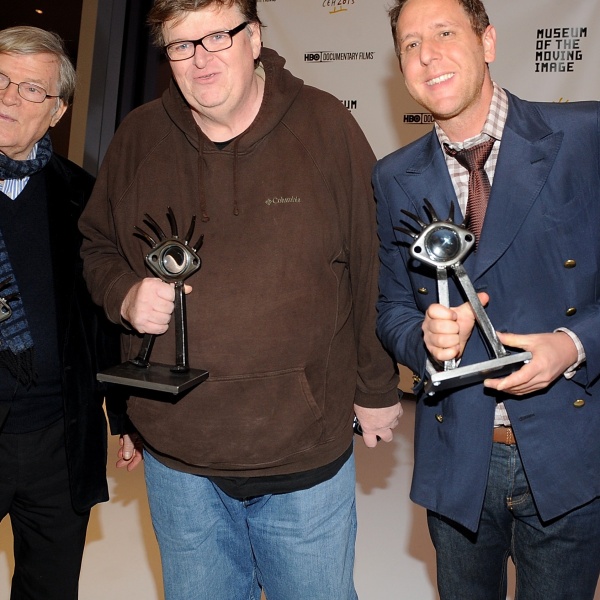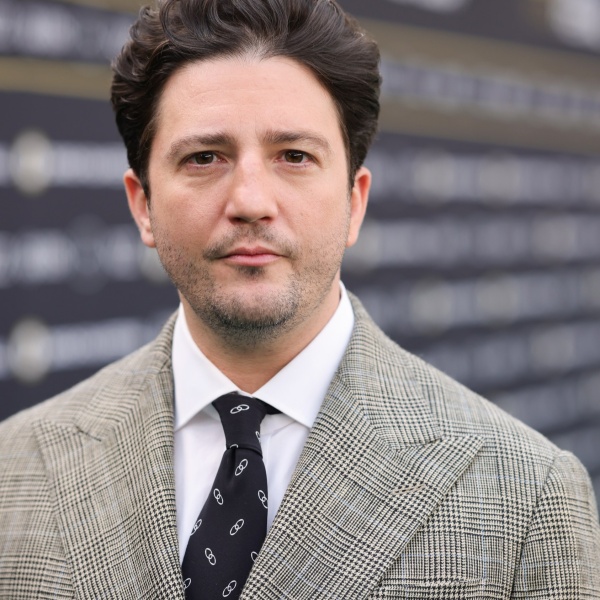
I’m going to put it bluntly: If The Playlist didn’t take me on as a contributor I would have never seen as many movies as I had, and nearly half of my list would probably be sitting in my Netflix queue well into 2011. So without being sappy (and yes, in being totally public about it), I appreciate the whole thing more than I could possibly describe. That’s the family, the readership, everything — even “dude” — thanks for having me.
As far as the list goes, I didn’t want to get swayed into picking a majority from the end of the year. It would’ve been too easy and a bit unfair, but that’s the way the system seems to go. Great movies stay with you, that’s very evident but it’s easy to be taken by ones that are still fresh in your mind. It’d be fake to completely stay away from the fall crop as well, especially considering their high quality, so whittling down a list from thirty proved to be quite a feat (and also why this is as late as it is). Movies that spoke most to me were ones that struck with some sort of complexity by directors that not only strayed from the norm, but did it successfully and with reason. I proceeded to strike from the list accordingly.
And then I was left with about 20 and had to go from there.
Clearly I wasn’t feeling the whole “this was a bad/not good/shitty year for movies,” though honestly I’m always in the dark when numerous people start dropping those lines in their pieces. To each his own I suppose. After finally narrowing things down (and almost shaking the vague feeling of guilt, as if these were not movies but friends chosen for a team), my list stands at 10, with a few stragglers that are still noteworthy.
Toast to 2010!
 10. “No One Knows About Persian Cats” dir. Bahman Ghobadi
10. “No One Knows About Persian Cats” dir. Bahman Ghobadi
Key Iranian new-wave player Bahman Ghobadi was never as experimental as teammate Abbas Kiarostami, seemingly more interested in neo-realism, a style that Italy explored fruitfully in the late ’40s. His 2010 picture saw him loosen up a bit, following two band members through the underground music scene of Iran and even appearing in the movie himself, personally vocalizing his distaste with the heavy censorship of art in his country. There’s something for everyone here, from indie-pop to rap to heavy metal (in a barn, no less) that the protagonists are introduced to in their search for a backing band. It’s quite an ingenious way to bring an unknown collection of bands and singers to the general public, as the plot here isn’t as important as the exploration and discovery of these new artists. There’s country specific things shown in a new light, the struggles they endure not only to book a show but to even practice, which won’t land them a spanking like us but instead land them in prison. Quite possibly the most endearing part is the huge sense of camaraderie among bands, no matter how different the genre or the people, they’re in this together. This sentiment is truly affecting, considering we live in a society where musicians either stay in their cliques or opt to shit-talk each other. It’s not a plea for “Why don’t we all just along,” it’s more so a call-to-arms to stop acting so juvenile and self-important.
 9. “Valhalla Rising” dir. Nicholas Winding Refn
9. “Valhalla Rising” dir. Nicholas Winding Refn
A Tarkovskian Norse movie? Yes please. Who knew that the Danish auteur — responsible for the brash Tom Hardy vehicle “Bronson” — could shape a moody art film out of the search for a Crusade, one that leads everyone to brutal death by volatile natives in North America? Maybe not even Refn. Part bad-ass, part abrasive, and wholly unnerving, those unable to deal with its deliberately slow-burn pacing are truly missing out on a worthwhile trip. One of the best scenes, one that’s the most indicative of its eerie meditative nature, is the lengthy boat ride to Jerusalem, the same ride that takes them to “Hell” instead. The gradual descent into madness is draped in thick fog and orchestrated carefully, eventually boiling to a near mutiny and paranoia-induced murder of a child. Perturbingly teeth chattering is what it is, and you can’t wait for them to get off the goddamn boat, even though it will lead to certifiable doom.
 8. “Dogtooth” dir. Giorgos Lanthimos
8. “Dogtooth” dir. Giorgos Lanthimos
Greek Haneke/Seidl-inspired Giorgos Lanthimos makes a stomping name for himself in this cold mind-fuck, where parents hide their kids away from the world and design their own reality. While I didn’t find it as hilarious as most (including the much too obnoxious people I sat in front of), the silliness of what these “children” (well in their 20s and 30s) believe becomes much more demented and unnerving as it the story professes. What could have easily ended up as a schtick unearths some pretty piercing criticism on modern day over-protective parenting or just parenting/care-taking in general (certain moments, however slightly altered, might remind one of ways they have been raised — cute nicknames for other things or ways they have raised pets, such as the classic-now-cruel dog nose in house pee). Yes, it’s extremism, but it portrays the dangers of lying to children in order to safeguard them. Kudos to the actors playing the arrested development kin, who nail the child-like nature in a brilliant, reserved way.
 7. “The Oath” dir. Lauren Poitras
7. “The Oath” dir. Lauren Poitras
The middle sibling of the filmmaker’s documentary series detailing post 9/11 life, Lauren Poitras brilliantly concocts an multifarious look at two former members of Al-Qaeda: Bin-Laden’s bodyguard, readily available for interview, and Bin-Laden’s driver, who is unable to participate due to his imprisonment in Guantanamo Bay. A chilling, unflinching look at both the American government and terrorist organizations. Sure, the topic doesn’t exactly grab people anymore — unfortunately — but the things Poitras culls from what is essentially one giant interview is quite remarkable.
 6. “The Strange Case of Angelica” dir. Manoel de Oliveira
6. “The Strange Case of Angelica” dir. Manoel de Oliveira
This one took a while to fully bloom, but it tactily rooted itself tightly to my heart and has grown steadily ever since. A man falling in love with a dead woman, hallucinating her winking in pictures and flying with her ghost should be dippy, but century old director Manoel de Oliveira is so delicate with his touch that it’s instead full of longing and charm. It’s a kind of film you don’t see anymore, one so sincere and magical that it’s practically from a different time period.
 5. “Scott Pilgrim vs. the World” dir. Edgar Wright
5. “Scott Pilgrim vs. the World” dir. Edgar Wright
Next to “King of Kong: A Fistful of Quarters” and “The Wizard,” this is the best video game movie, hands down. It’s also a funny, complex tale on love and relationships, one that manages to somehow satirize, critique, and embrace the generation/clique it follows. Detractors were a total bummer on this one, too caught up on why Scott liked Ramona. etc., etc., even unable to look past its so-called faults and enjoy the dazzling fight sequences or bizarre humor. Since there wasn’t a scene directly explaining a character’s feelings, somehow the inferable was rejected. Yes I am bitter, but I’m still not sure why spineless comic-book movies get a pass time and time again and this didn’t. If you’re going to misread a movie that’s about (but not limited to) personal growth, insecurity, society’s inability to converse, and the peril of comfort zones, at least enjoy yourself doing so.
 4. “The Temptation of St. Tony” dir. Veiko Õunpuu
4. “The Temptation of St. Tony” dir. Veiko Õunpuu
It’s unbelievable that an Estonian take on Dante’s Inferno exists, but even more unfathomable is that it’s shot like Bela Tarr and directed like Jacques Tati. But it’s here, in all its insane glory, lampooning capitalism, the upper-class, men, women, and religion. It’s also a sort of retelling of Job, with all of Tony’s attempts at good nature resulting in at least three bad things per deed. When not farcical, the piece is downright frightening, one key scene involves a descent into a seedy night club of cannibals. It shouldn’t work — the mere thought of showing these ideas to investors is nerve wracking — but it does, and much too well. Scintillating, austere, and surreal to the bone, its haunting final moments are like Godard snorting Bergman during “Week End.” Completely unforgettable.
 3. “The Milk of Sorrow” dir. Claudia Llosa
3. “The Milk of Sorrow” dir. Claudia Llosa
Llosa’s observant cultural tale is a shrewd gem that has the slightest touch, even if the main character literally has a potato in her vagina. Elements of Reygadas and Costa peak out, but it’s her lead, Magaly Solier, that keeps things from feeling too cold. Surrounded by a wealth of non-actors that deal out the kind of performances that realist directors beg for, Solier drifts through the story in a lost haze, being taken advantage by every cruel hoggish lout imaginable yet maintaining a quiet strength through it all. The premise of a woman who can’t afford to bury her mother would be melodrama in less assured hands, but Llosa is thankfully smarter than that, instead exposing blind human selfishness. This is also one of the only films I’ve seen to illuminate the literal cost of death, and to showcase the oddity that is mass weddings — those alone deserve great credit for their mere inclusion.
 2. “Black Swan” dir. Darren Aronofsky
2. “Black Swan” dir. Darren Aronofsky
It took me two viewings to really appreciate Darren Aronofsky‘s ballet-thriller (never thought I’d write that sub-genre). On the surface, it’s a successful suspense tale with a special focus on the art, cattiness, and torment of ballet. Underneath that is a myriad of substance, a lot of which is lamentably either being taken for granted or neglected. There’s the layered casting, such as fitting Winona Ryder as the has-been, an actress who would be getting Natalie Portman’s roles if this were a decade earlier. Its editing is stylistically inconspicuous, employing cross fades during her fragile/innocent moments and cutting hard when not. Yes the tone is big, something should be: you don’t detail a person’s descent into insanity as a subtle one. Polanski for sure, but don’t overlook influences like Cassavetes (backstage/rehearsals remind of “Opening Night,” her madness is almost as disturbingly bizarre as “A Woman Under the Influence“) and Lynch (the excessively grandiose subway pervert is akin to the bizarre bell hop in “Twin Peaks,” that devilish monster like the creature in “Mulholland Drive.”). Even the lessons of Brecht crop up, Aronofsky employs the “alienation effect” by using aureate music at improper times or by having the black swan gaze directly into the lens during her performance. These are accomplished, well-thought moves that intensify the already harrowing experience, more importantly (especially to the naysayers) they could’ve easily been overlooked by someone too intent on a strong genre picture instead of a work of art. To my original dismay, some scare elements seemed silly — animated paintings come to mind — but a subsequent viewing showed that it’s not a horror movie but a person in a horror movie. There’s all of this plus the nature of identity, the toll of art performance, living through and changing for others, the dangers of protective naivety and innocence, etc. Portman is brilliant and wound tighter than her hair bun; if she doesn’t win the big award for her turn in this psycho-sexual tale I will be forced to flood the academy.
 1.”Alamar” dir. Pedro Gonzalez-Rubio
1.”Alamar” dir. Pedro Gonzalez-Rubio
Banco Chinchorro, the largest coral reef in Mexico, is not only the gorgeous setting for the most moving film of 2010, it was also one of the prime characters in Pedro Gonzalez-Rubio‘s intimate documentary/narrative hybrid. Forgoing traditional plot elements, the director uses a minimalist approach to examine the relationship between father and son as he passes his knowledge down to the next generation. Not to be too plain, also at large is the bond between man and nature, something which seems to be slipping from our grasps (or becoming a chore or dull — see how the mother/wife becomes disillusioned with the life). No other film this year bled with such genuine love, and the appropriate sinking feeling when the son leaves his father is only heightened when it’s discovered that those blue waters populated by varied indigenous wild life are slowly being destroyed. Preachy it isn’t: much of the running time does without music or even dialogue, and when it does appear it is succinct. Gonzalez-Rubio would rather frame a tender scene of the family members playing with a bird against the backdrop of a makeshift home, one they constructed in the beginning, to the sounds of the calming water. The visuals and actions do the talking, they speak volumes.
Honorable Mentions: What Almost Made It, In Absolutely No Order
(Except the top two)
“Inception“
“Life During Wartime“
“Greenberg“
“The Good, the Bad, the Weird“
“Animal Kingdom“
“The Illusionist“
“Four Lions“
“White Material“
“Wild Grass” (which certainly begs a rewatch)
Movies That Were On Last Year’s List
Even though these movies qualify for this year, I had them on a personal list and as much as I like them, out with the old and in with the new. As good as they are it doesn’t seem fair to put them on two lists, now does it?
1. “Secret Sunshine“
2. “Mother“
3. “A Prophet“
In defense of: “Shutter Island“
What many people derided for being simply a b-thriller with an a-list cast and crew, “Shutter Island” has a lot more going for it than most will give credit. Chiding it for its last minute Shyamalan twist is unfounded; we know Daniels is crazy the second the movie opens. Starting in a room with shackles on the ground, Leo speaks frantically to himself before heading up to the deck of the ship, which sails against a very distinct green screen. If that’s not enough to know that the masterful filmmaker is up to something, his protagonist has a conversation with his dead wife about 15 minutes into the movie. I’m not sure about you, but talking to your dead wife is pretty fucking loony. In knowing that the story is all set up, its shlockiness works: what kind of a story would a team of doctors make up other than a pulpy airport news-stand thriller? Everyone’s acting (role-playing, LARPing, what have you) with Mark Ruffalo channeling Humphrey Bogart and Robin Bartlett sounding like she’s rehearsing lines. Its sense of humor (“You blew up my car, I liked that car” and the silly easel display at the end) takes away the dead-seriousness most of its kin fall victim to, and the plot (particularly the end sequences — from the sit down to the smoke outside) is not only handled with a maturity unseen in this genre, but also seem to hold a sort of acuminous subtext on the art form itself. Is this Scorsese airing his distaste at the stale, cyclical state that the Hollywood thriller/mystery has nestled into, something far and away from the piercing “Laura” et al, with Ben Kingsley and Ruffalo representing the director’s ploy and disappointment? It’s not brilliant and it probably won’t win any awards aside from its NBR and Teen Choice prizes, but it should recognized that “Inception” wasn’t the only $300 million grossing tentpole to show some smarts.
Great Documentaries
I’ve seen more documentaries this year than any other, therefore I wanted to give them special attention rather than lumping them in honorable mentions. All are worth your time and go against the boring conventions or cutesy shlock that the genre tends to fall into. In no order…
“Red Chapel“
“The Tillman Story“
“Winnebago Man“
“Queen Beetle Invades Tokyo“
“Enemies of the People“
“Exit Through the Gift Shop“
“Marwencol“
“And Everything Is Going Fine“
No Distribution!
These films I have seen either by bootleg means or in other countries, and to my knowledge they still have no U.S. distribution. If you can find them, watch them.
1. “The Clone Returns Home” – Japanese thinker a la “Solaris” OR the artsier “Moon,” whichever makes you yearn for a stateside release more.
2. “The Banishment” – Russian moody thriller, if thrillers were Andrei Tarkovsky’s bag.
3. “Involuntary” – Swedish mishmash of social critiques, third cousin of “Code Unknown.”
4. “Windows on Monday” – German minimalism, maybe if “Safe” was less scary and more freeform.
5. “Saviour Square” – Polish social drama, its keen eye for the destructive pettiness that can take hold of families is a bit more conventional Mike Leigh, but affecting none-the-less.
6. “Our Beloved Month of August” – Portuguese fiction/non-fiction about a director’s project falling apart AFTER arriving in a mountain village, this is his consequential attempt to make a movie regardless of his misfortune. A little Kiarostami and a little Panahi.
That’s all folks…Sorry for saying that.





